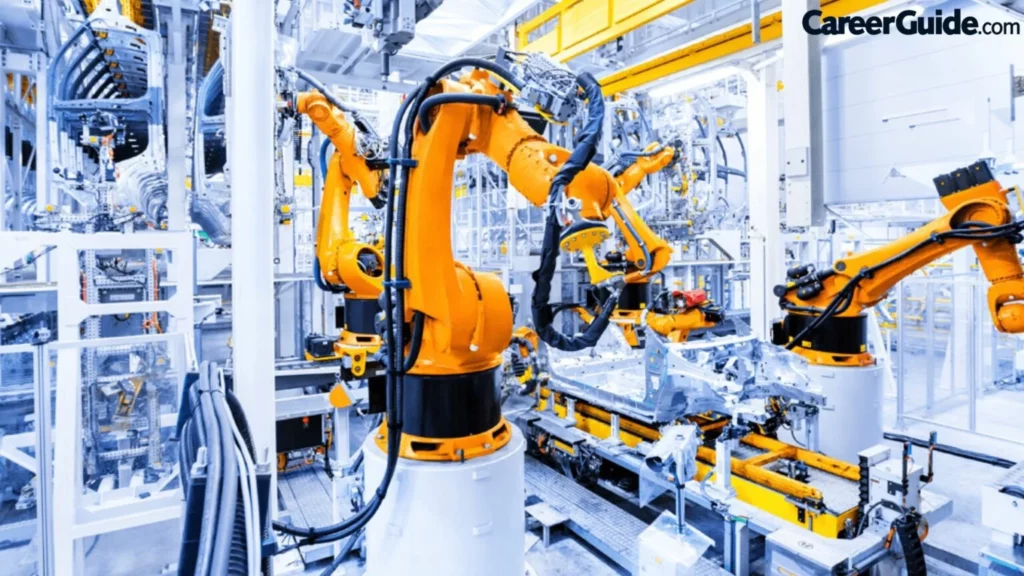The world is becoming very high-tech. Due to which career options are also becoming hi-tech. Earlier, only a traditional engineering degree was available in the field of engineering, but increasing technology has started the era of new courses in the field of automation robotics engineering. Automation and robotics engineering of which is the main course. At present, this sector of engineering is a great course in terms of career and salary. If you also have the eagerness to make a career in this field of technology, then you can make your dream come true by getting a related degree in this field. In this article we will tell you about scope of robotics.
Scope of Robotics:
NIRF top engineering colleges 2023
What is robotics and automation engineering

A robot is an automatic mechanical machine. That works by combining computer programs and electronic machines that you give or assign commands to. Software, control system, power supply, manipulators are all necessary things in this system. Robotics deals with the design, construction, operation of robots.
automation robotics engineering is an emerging field. Therefore, excellent employment opportunities are available in this field. Candidates doing Robotics Engineering Course can work in the field of Robotics Research and Development, Robot Manufacturing and Testing, Quality Control. Here you can work as Robotics Engineer, Robotics Scientist, Technician.
ENTRANCE EXAM QUESTIONS
Students doing master’s degrees in robotics can do jobs in space research organizations like ISRO and NASA. Apart from NASA, candidates in this field get job opportunities in many other private industries, automobiles, and industrial tools.
In today’s time, robotics is being used in many sectors. In this, you can make a career in Industrial Robotics or you can also start a career in the field of Safety Robotics such as Military or Bomb Deactivation Robotics. Read further about scope of robotics in this article below.
NIRF top engineering colleges 2023
Requirements

To make a career in Robotics, you need to study Physics and Mathematics subjects in 12th. Along with this, you should always have the ability to do something new and innovative. To make a career in Robotics, you must first have a BE or BTech degree in Computer, IT, Mechanical, Mechatronics, or Electrical Engineering. After this, you can take a master’s degree in robotics. Apart from this, if you want, there is also a degree in robotics in many big institutes of the country, you can also study from there.
ENTRANCE EXAM QUESTIONS
Automation and Robotics Engineering College in India
NIRF top engineering colleges 2023
Some online courses

- Robotics Specialization (Coursera)
- Robotics (Provided by Columbia University via edX)
- Begin Robotics (Provided by Future Learn)
- Robotic Process Automation (Provided by LinkedIn Learning)
- Mechanisms and Motion – Robotics Focus (Provided by Udemy)
- Modern Robotics: Mechanics, Planning, and Control Specialization (Provided by Northwestern via Coursera)
- Learn Robot Operating System: Basics (Provided by SkillShare)
- Introduction to Robotics Masterclass (Provided by QUT Robot Academy)
- Introduction to Robotics (Provided by MIT Open Courseware)
- Introduction to Robotics (Provided by Stanford University)
ENTRANCE EXAM QUESTIONS
Job Options
In the field of robotics engineering, there is an opportunity to work in the following positions, such as
- Robotics programmer
- Robotics design engineer
- Robotics systems engineer
- Robot test engineer
- Automated Product Design Engineer
NIRF top engineering colleges 2023
Scope of Robotics
In today’s time, getting humans to work with robots has become not only a necessity but also a compulsion. There are many things that cannot be done without robots. So there is scope of robotics as a career in automation robotics engineering. After taking a professional degree in Robotics, you can easily get jobs in the fields of NASA, Private Industries, Automobiles, and Industrial Tools. In this field, you get jobs in roles like Robotic Scientist, Robotic Engineer, Robotic Technician. Read further about scope of robotics in this article below.
ENTRANCE EXAM QUESTIONS
Robotics and automation engineering salary
automation robotics engineering Salary is a rapidly growing field that involves the design, development, and implementation of robots and automated systems for a variety of applications. This field combines knowledge of mechanical engineering, electrical engineering, and computer science to create intelligent machines that can perform tasks with high precision and efficiency.
Some key facts about the robotics and automation engineering salary include:
- According to the U.S. Bureau of Labor Statistics (BLS), the median annual salary for mechanical engineers, which includes robotics and automation engineering salary, is $87,040 as of May 2020.
- The lowest 10 percent of mechanical engineers earn less than $62,430, and the highest 10 percent earn more than $132,830.
- The median annual salary for electrical engineers, which includes robotics and automation engineers, is $97,970 as of May 2020.
- The lowest 10 percent of electrical engineers earn less than $69,430, and the highest 10 percent earn more than $146,660.
- Robotics and automation engineering salary tend to earn more than other types of engineers. For example, civil engineers typically earn a median salary of $87,040 per year, and industrial engineers earn a median salary of $87,040 per year.
- The highest paying industry for robotics and automation engineering salary is the federal government, which pays a median salary of $111,820 per year. The industry with the highest median salary for electrical engineers is the scientific research and development services, which pays a median salary of $120,510 per year.
- The highest paying states for mechanical engineers are Alaska, California, and Massachusetts, which all have a median salary of over $100,000 per year. The highest paying states for electrical engineers are California, Alaska, and Massachusetts, which all have a median salary of over $110,000 per year.
NIRF top engineering colleges 2023
- automation robotics engineering salary with advanced degrees, such as a master’s degree or PhD, tend to earn higher salaries than those with just a bachelor’s degree.
- robotics and automation engineering salary with several years of experience tend to earn higher salaries than those just starting out in the field.
- Robotics and automation engineers working in big cities tend to earn higher salaries than those in smaller towns or rural areas.
- Robotics and automation engineers working for large, well-established companies tend to earn higher salaries than those working for small or start-up companies.
- The demand for robotics and automation engineers is expected to grow rapidly in the coming years as more companies adopt automation and robotics technology to increase efficiency and reduce costs. The BLS predicts that employment of mechanical engineers will grow by 4% and electrical engineers by 4% from 2020 to 2030.
- Many companies in the manufacturing, automotive, aerospace, and healthcare industries are investing heavily in automation and robotics technology, which is driving demand for robotics and automation engineers.
- Robotics and automation engineers are also in high demand in the logistics and transportation industry, as well as in the oil and gas industry.
- Robotics and automation engineers with experience in programming languages like C++, Python, and MATLAB, as well as experience with robotic operating systems such as ROS, are highly sought after by employers.
ENTRANCE EXAM QUESTIONS
In conclusion, automation robotics engineering salary is a rapidly growing field that involves the design, development, and implementation of robots and automated systems for a variety of applications. The field is multidisciplinary, combining knowledge of mechanical engineering, electrical engineering, and computer science. robotics and automation engineering salary tend to earn more than other types of engineers. The median salary for mechanical engineers is $87,040 and for electrical engineers is $97,970. The demand for robotics and automation engineers is expected to grow rapidly in the coming years as more companies adopt
NIRF top engineering colleges 2023
Scope of Robotics and automation engineering

automation robotics engineering Scope is a multidisciplinary field that involves the design, development, and application of robots and automated systems. The field has seen significant growth and advancement over the past few decades, and continues to be a rapidly evolving area of technology.
One of the key areas of focus in automation robotics engineering Scope in industrial automation. This involves the use of robots and automated systems in manufacturing, assembly, and other industrial processes. Industrial automation has been widely adopted in a variety of industries, including automotive, electronics, and food and beverage production. The use of robots and automated systems in these industries has led to increased efficiency, reduced costs, and improved product quality.
Another important area of robotics and automation engineering is service automation. This involves the use of robots and automated systems in areas such as healthcare, education, and retail. In healthcare, robots are being used for tasks such as surgery, rehabilitation, and patient monitoring. In education, robots are being used as teaching assistants and for interactive learning. And in retail, robots are being used for tasks such as inventory management and customer service.
ENTRANCE EXAM QUESTIONS
NIRF top engineering colleges 2023
To pursue a career in robotics and automation engineering, a strong background in mechanical engineering, electrical engineering, control systems, and artificial intelligence is required. The field is constantly evolving, and professionals in this field must be able to adapt to new technologies and developments in order to remain competitive.
Overall, the Robotics and Automation Engineering Scope is broad and encompasses a wide range of areas. From industrial automation to service automation, from robotics research to human-robot interaction, and from field robotics to the development of new technologies, the field offers many opportunities for innovation and advancement. As technology continues to advance and robots and automated systems become more prevalent in our daily lives, the field is expected to continue growing and expanding in the future.
ENTRANCE EXAM QUESTIONS
Scope of Robotics Engineering in India

Robotics Engineering Scope in India is a rapidly growing in India, with a wide range of applications and opportunities for innovation and advancement. The scope of robotics engineering in India is broad and encompasses a variety of areas, including industrial automation, service automation, field robotics, and research and development
One of the key areas of focus for Robotics Engineering Scope in India is industrial automation. The Indian government has been actively promoting the adoption of automation and robotics in manufacturing and other industries as part of its “Make in India” initiative. This has led to an increase in the use of robots and automated systems in industries such as automotive, electronics, and food and beverage production. Robotics and automation has helped to increase efficiency, reduce costs, and improve product quality in these industries.
NIRF top engineering colleges 2023
Another important area of focus for Robotics Engineering Scope in India is service automation. Robots and automated systems are being increasingly used in areas such as healthcare, education, and retail. In healthcare, robots are being used for tasks such as surgery, rehabilitation, and patient monitoring. In education, robots are being used as teaching assistants and for interactive learning. And in retail, robots are being used for tasks such as inventory management and customer service.
Field robotics is another area of focus for Robotics Engineering Scope in India. This involves the use of robots in outdoor and unstructured environments, such as in agriculture, mining, and search and rescue operations. Field robots are typically highly mobile and able to navigate in challenging environments. They are used for tasks such as mapping, monitoring, and search and rescue.
Research and development is another important area of focus for Robotics Engineering Scope in India. There are several research institutions and universities in India that are actively working on the development of new technologies and techniques for robots, such as perception, planning, control, and learning. The Indian government has also been actively promoting research and development in the field of robotics and automation, through initiatives such as the National Robotics Mission
ENTRANCE EXAM QUESTIONS
To pursue a career in Robotics Engineering Scope in India, a strong background in mechanical engineering, electrical engineering, computer science and programming, control systems, and artificial intelligence is required. The field is constantly evolving, and professionals in this field must be able to adapt to new technologies and developments in order to remain competitive.
In summary, Robotics Engineering Scope in India is a rapidly growing field with a wide range of applications and opportunities for innovation and advancement. From industrial automation to service automation, from field robotics to research and development, the field offers many opportunities for professionals to make a significant impact. With the Indian government’s focus on promoting automation and robotics, the field is expected to continue growing in the future.
NIRF top engineering colleges 2023
Frequently Asked Questions (FAQs)
Q:What are the different career options in robotics and automation?
In robotics and automation, there are several job choices, including:
- Robotics engineers create, assemble, and test robotic systems. They are used in many different sectors, including as manufacturing, healthcare, and logistics.
- Engineers in automation create and put automation systems into action. They are used in many different sectors, including as manufacturing, healthcare, and transportation.
- Programmer: Programmers create the computer code that governs automated systems and robotics. They are used in many different sectors, including as manufacturing, healthcare, and transportation.
- Robot and automation systems are put to the test by testers to make sure they are trustworthy and safe. They are used in many different sectors, including as manufacturing, healthcare, and transportation.
Q:What are the qualifications required for a career in robotics and automation?
Depending on the exact function, different qualifications are needed for a career in robots and automation. However, a bachelor’s degree in engineering, computer science, or a related discipline is necessary for the majority of positions. Some positions could additionally call for extra certificates, such a robotics or automation certification.
Q:What are the skills required for a career in robotics and automation?
- Strong problem-solving abilities are necessary for robotics and automation engineers in order to recognise and address complicated issues.
- The ability to develop code that controls robots and automation systems is a need for robotics and automation engineers.
- electrical and mechanical expertise: Robotics and automation engineers need to have a solid grasp of electrical and mechanical principles.
- Robotics and automation engineers must be proficient communicators with other engineers, technicians, and business executives.
Q:What are the challenges of a career in robotics and automation?
- Engineers must be able to stay up with the most recent technological advancements because robotics and automation is a sector that is developing quickly.
- The requirement for independence: Robotics and automation engineers frequently work individually, thus they must be able to do so efficiently.
- The necessity of teamwork: Robotics and automation projects frequently require a team of engineers, thus it is important for them to be able to collaborate well with others.













